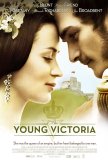Young Victoria, The (United Kingdom/United States, 2009)
December 14, 2009
The Young Victoria, which was selected as the closing film of the 2009 Toronto Film Festival (a position that often attracts mediocrity), isn't so much poorly made as it is uninspired. It's hard to determine whether the root cause is that the early years of Victoria's reign were inherently dull or whether the production makes them seem that way. With a muddled focus that can't hone in on whether this should be a period piece romance or a dissection of the cloak-and-dagger politics of the day, The Young Victoria never gels. The pedestrian screenplay and lackluster direction by French Canadian filmmaker Jean-Marc Vallée disallow the members of a generally fine cast to accomplish much with their roles. The Young Victoria feels like a wasted opportunity and is among the least impressive in a long line of motion pictures about British royalty.
The film starts out juicily enough. Victoria (Emily Blunt) is a year shy of her majority and her mother, the Duchess of Kent (Miranda Richardson), and the head of her household, Sir John Conroy (Mark Strong), are already plotting how to control the youthful monarch once she ascends to the throne upon the death of King William (Jim Broadbent). They want her to sign papers making them regents, but she refuses. They continue to scheme but at this point the movie loses interest in them. They show up from time-to-time during the rest of the film but in marginalized roles. The story shifts to the romance between Victoria and Prince Albert (Rupert Friend), who has been sent from Germany by his uncle to gain influence over the young soon-to-be queen. Meanwhile, on the home front, Victoria has fallen under the spell of Lord Melbourne (Paul Bettany), the Prime Minister, who wants to shape her opinions and use her as a political trump card.
Historically, The Young Victoria is reasonably accurate, although its portrayal of King Leopold of Belgium (Thomas Kretschmann), Victoria's uncle and one of her principal advisors, is in a negative light. The film covers only the period from 1836 (a year before she became queen) until 1841 with a couple of brief flash-forwards at the end. As the title implies, it is not a comprehensive look at Victoria's reign. A more dramatically compelling film about the queen, which chronicles her later years, is 1997's Mrs. Brown. A better rendition of the segment of Victoria's life covered in this movie can be found in the 2001 TV mini-series, Victoria & Albert, which is available on DVD.
The most fascinating elements of films about rulers relate to the behind-the-scenes politicking, backstabbing, and influence peddling. There's plenty of that going on in The Young Victoria - Conroy's failed attempt to strong-arm his future liege into making him a regent or personal secretary, Melbourne establishing "control" over her, and Albert's shaking off the leash placed upon him by Leopold. None of the various plots, however, are strongly developed and the screenplay, credited to Julian Fellowes (who has written a number of classic adaptations for British TV), keeps them mostly in the background. Those who enjoy movies about royalty for the delight of seeing the monarch outwit and overmatch his/her opponents will find little to appreciate in The Young Victoria.
The romance between Victoria and Albert is intended to be the film's emotional centerpiece, but it comes across as tepid. There's not much of a spark between Emily Blunt and Rupert Friend. The film's attempts to spice up their sex life (to the extent that anything can be considered to be "spiced up" in a PG-rated movie) raises an eyebrow when one considers that Victoria's lasting legacy may have been her strict code of morality. Ultimately, one almost feels more affection from Victoria for her pet spaniel than for Albert.
Emily Blunt, normally known for fiery performances (as in My Summer of Love and The Devil Wears Prada), is surprisingly bland here, never really bringing Victoria to life. Her task isn't made easier by an equal lack of animation evident in Friend's work. Paul Bettany is solid but his role is secondary. The same can be said of Miranda Richardson. Mark Strong has the makings of a good villain but, after his early attempts to force Victoria into signing a regency agreement, he disappears into the background. (He gets a chance to be a more substantive bad guy in Guy Ritchie's Sherlock Holmes.) Jim Broadbent is in fine form, but he's in so little of the film (about three scenes before his character dies) that his participation is easily forgotten.
As is almost always the case with British period pieces, The Young Victoria is a visual treat. The coronation scene, with its colorful palette and rousing rendition of "Zadok the Priest," offers a mesmerizing cinematic moment. Vallée displays an excellent eye for the time period if not for the characters inhabiting his drama. (There are also instances in which the dialogue sounds jarringly modern.) For those who are students of the British monarchy, the film represents a curiosity - a chance to see how a group of filmmakers have chosen to represent this phase of history on the screen. For the average movie-goer, however, the film lacks the verve necessary to make the tale engrossing in the way Elizabeth did. (To be fair, the 1500s make for more rousing cinema than the 1800s.) The result is a well-mounted production that comes across as a little dull, rambling, and undercooked.
Young Victoria, The (United Kingdom/United States, 2009)
Cast: Emily Blunt, Rupert Friend, Miranda Richardson, Paul Bettany, Mark Strong, Thomas Kretschmann, Jim Broadbent
Screenplay: Julian Fellowes
Cinematography: Hagen Bogdanski
Music: Ilan Eshkiri
U.S. Distributor: Apparition
- Cheri (2009)
- Companion (2025)
- (There are no more better movies of Rupert Friend)

Comments